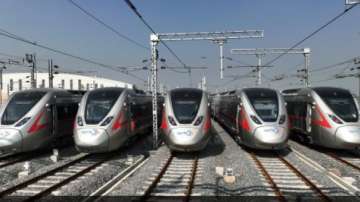Delhi-Meerut RRTS Corridor News: The Delhi-Ghaziabad-Meerut route is soon going get a functional Regional Rapid Transport System (RRTS), which will enhance connectivity in the National Capital of India.The primary objective behind this initiative is to improve connectivity in the region, and the RRTS stations will now have seamless connections with the Delhi metro stations.
Route:
The Delhi-Meerut RRTS Corridor will cover a distance of 82 kilometers, with 17 kilometers of elevated section and 65 kilometers of the section running at ground level. The corridor will have a total of 24 stations, out of which 16 will be elevated and 8 will be underground. The RRTS corridor will start from Sarai Kale Khan in Delhi and end at Modipuram in Meerut. The journey time between the two cities is expected to reduce significantly, with the travel time estimated to be around one hour.
ALSO READ: 'Artless concrete eyesores': Jet Airways CEO on Indian metro stations, compares them with Dubai
Stations:
The RRTS corridor will have 24 stations, and each station will be equipped with state-of-the-art facilities, including lifts, escalators, and modern ticketing systems. The 16 elevated stations on the corridor will be Sarai Kale Khan, New Ashok Nagar, Anand Vihar, Sahibabad, Ghaziabad, Guldhar, Duhai, Modi Nagar South, Modi Nagar North, Meerut South, Mohiuddinpur, Partapur, Rithani, Shatabdi Nagar, Brahampuri, and Meerut North. The eight underground stations on the corridor will be Mayur Vihar Phase-1, Sarai Kale Khan, New Ashok Nagar, Anand Vihar, Meerut Central, Bhaisali, Begumpul, and MES Colony.
ALSO READ: Gurgaon-Faridabad Metro UPDATE: 12 stations to be built on the proposed route
Inauguration:
The Delhi-Meerut RRTS Corridor is expected to be inaugurated in three phases. The first phase, between Sahibabad and Duhai, is expected to be operational by 2023. The second phase, between Sahibabad and Shatabdi Nagar, is expected to be operational by 2025. The third and final phase, between Sahibabad and Modipuram, is expected to be operational by 2026.
Benefits:
The Delhi-Meerut RRTS Corridor is expected to bring several benefits to the people of the National Capital Region. The RRTS corridor will provide a fast, safe, and comfortable mode of transportation between Delhi and Meerut, reducing travel time and congestion on the roads. The RRTS corridor is also expected to promote sustainable development by reducing carbon emissions and promoting the use of public transportation.
Latest India News
